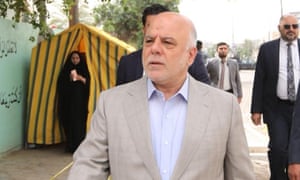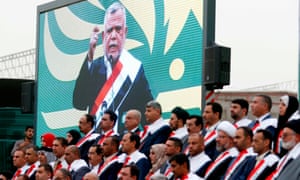Under grey skies, along empty streets, Iraqis trickled to the polls on Saturday unconvinced that the leaders on offer can finally stabilise a country exhausted by war and dysfunction.
Before the voting, Iraq’s fourth national election since the US-led invasion that toppled Saddam Hussein had been hailed as its most instructive yet, a time when a long elusive calm could finally take root, now that the Islamic State terror group has been curbed.
But as voters trudged towards polling stations, there was none of the euphoria of previous polls – where purple ink-dipped fingers were happily displayed – and almost no energy surrounding the process. Iraqis had done it all before, and elections had delivered little. Election monitors outnumbered voters at several polling stations in west Baghdad. “I’m just doing my duty,” said Samira Ahmed in the suburb of Mansour. “We hope it will lead to something, but we doubt it,” said a second woman.

Iraq’s leaders, on a war footing for much of the past four years, had eschewed battle credentials and instead focused on peacetime state-building efforts, such as cutting corruption and transforming a moribund economy. Many citizens, however, remain resentful that fighting a war was used to justify doing little else, and wary of claims that this poll could really mark a turning point.
“Iraq is tired,” said Fareq al-Ani, 82, as he voted in the Baghdad suburb of Arasat. “We need a loyal and noble man to take care of it properly. Now that the situation is calmer, the road is open for changes. The politicians know what and where the damage is. Will those we elect take care of widows and orphans and provide services? I wonder. Or will we face another morally corrupt and compromised leader?”
The contest to lead Iraq has come down to a two-way race between the incumbent prime minister, Haider al-Abadi, and challenger, Haidar al-Ameri, who led a large organisation of civilian fighters in the Isis war, and wants to ride into high office on the popular momentum of having been a militia leader. Both men, as well as other contenders, have been at pains to claim that the sectarianism that has blighted Iraq since shortly after the fall of Saddam is less of a factor than at any time since.

To some Sunni Iraqis, such claims are being made by leaders from the majority Shia sect who have gained much at their expense. Sunnis, who enjoyed privileged status under the former dictator, have been struggling to claw back parity since. While reincorporating the sect had been championed in the 2010 poll in particular, the horse trading involved in forming a government after the ballot made crossing sectarian lines a political minefield. With sectarian and ethnic representation institutionalised in Iraqi politics, there is little to suggest that the process will be more straightforward this time around.
Nevertheless, Shia leaders who played prominent roles in the country’s vicious civil war claimed openly before the vote that Iraq would never settle down until Sunnis were unambiguously brought back into the fold. Muqtadr al-Sadr, whose Jaish al-Mahdi militia was a main protagonist in the war, which displaced millions, has become a champion of Iraq’s Sunnis. His stance earned him an invite to Riyadh for an audience with Saudi Crown Prince Mohammed bin Salman and has won him favour in parts of the Sunni heartland.

“He means what he says, too,” said Bahaa Mutlaq, a Sunni merchant. “Of all the people to emerge as a patriot, no one thought it would be him.”
While determined efforts are being made to shake sectarianism, Iraq continues to be buffeted by forces over which it has less control. Friction between the US and Iran is at its highest in more than a decade after Donald Trump’s decision to rescind a nuclear deal that his predecessor had signed with Iranian leaders.
Despite Trump’s inclination to disengage from Iraq, Baghdad remains a battleground for the Pentagon and state department, where the future orientation of Iraq is bitterly contested with an ascendant Iran. Tehran is a robust backer of Ameri, while the US prefers Abadi. Neither man is fully locked into his backer, with each trying to balance the interests of the rival powers.
Both claim that homegrown nation-building needs to take precedence over tussles for influence between patrons and say that without serious, determined reforms, Iraq may never recover. “Managing the last few years of death and destruction, with tens of thousands killed, was the easy part,” said one Baghdad-based analyst and government adviser. “What comes next is more difficult.”
Abadi has pledged a Saudi-style economic overhaul that whittles down a bloated public sector and encourages private enterprise, at the same time as further cracking down on industrial-scale corruption, which is conducted by all parties to fund patronage networks. “There is a public sector of around four million people [not including two million more receiving pensions]. You need around 650,000 to run the show,” said the adviser.
Ameri’s PMF, which is looking for a postwar way to define its role, has pledged as a plank of their campaigns to lead the charge on corruption reforms. The organisation’s search for a purpose has led some to challenge its credentials as a peacetime force for change.
“They saved our asses in 2014, everyone appreciates that,” the adviser said, in reference to the group’s efforts to stop Isis seizing more areas of Iraq. “But they are the friend who shows up when you are not doing so well. When you’re looking to stabilise, build a state and root out corruption, they’re nowhere to be seen.”
At the Arasat polling station, Amina Kathim, 45, when asked about what comes next, threw up her hands. “We hope for the best but we’re uncertain and skeptical,” she said. “The candidates, once they’re elected, they tend to forget about us and their promises.”
Two men nearby, said they, too, expected little from the ballot. “We don’t believe in magic,” said Abu Ali, 50, an engineer. “Things will not change overnight like a spell. Real democracy and change will take time, but it is our duty as citizens to vote.
Saed Hatem Mohammad, 58, said: “I’m voting for Iraq. It’s a duty of mine as an Iraqi citizen. As for the candidates and their promises, we’re not expecting much, but they (the politicians) will have to face their conscience.”
The contenders in Iraq’s parliamentary election
Haider al-Abadi Incumbent PM running on the Shia-led, but cross-sectarian, al-Nasr list.
Haidar al-Ameri Led the PMF units during the Isis war. Supported by Iran. Running on Fateh list.
Nour al-Maliki, former PM, ousted after Mosul and northern Iraq fell to Isis. Like Abadi, a long-term member of the Dawa Shia Islamic party. Running on State of Law list.
Muqtadr al-Sadr Shia cleric and leader of civil war militia. Has since recast himself as a nation builder. Marching Forward list.
Ammar al-Hakim, Shia cleric, whose political list, al-Hikma, will be central to coalition-building.
With no candidate likely to win more than half the 329 seats needed to form a majority, a coalition is likely. That will take at least several months to be assembled. The eventual PM is likely to be Abadi or Ameri.
Additional reporting by Nadia al-Faour